With the roster set and the start of the World Junior Championship around the corner, Team Canada is primed and ready for the chance to get back on track to be a major force at the tournament.
On paper, this team looks to be dominant with the amount of talent and depth on the roster. While teams like Finland, Russia, Sweden and the United States are always expected to be the top teams as well, this is Canada’s best opportunity to win their 18th gold medal.
From offense to their speed and mobility on defence, there are many reasons why Canada will be successful and possibly the favourite at this tournament. Here are five keys to Canada’s success.
Goaltending: Canada’s X-Factor
In recent years, we’ve seen stellar performances in the crease from Zachary Fucale and Carter Hart when Canada ended up winning gold. Yet, we’ve also seen the questionable performances from Michael DiPietro last year and Mackenzie Blackwood in 2016 where goaltending didn’t meet expectations.
A Canadian goalie hasn’t been named goalie of the tournament since Steve Mason in 2008. Could there be a change this year? Olivier Rodrigue, Nico Daws and Joel Hofer all have their reasons to be the starter.
Rodrigue has the most experience out of the group in terms of international play. He was a major stand out for Canada during the Ivan Hlinka Memorial Cup in the summer of 2017, going 4-0 with a 1.00 goals against average en route to a gold medal. In 12 games at both the U17 and U18 level, he has an 8-4 record with a 1.91 goals against average (GAA). That’s pretty good. However, his numbers in the Quebec Major Junior Hockey League have been average, ranking 15th in both save percentage (SV%), .907, and GAA 2.79.
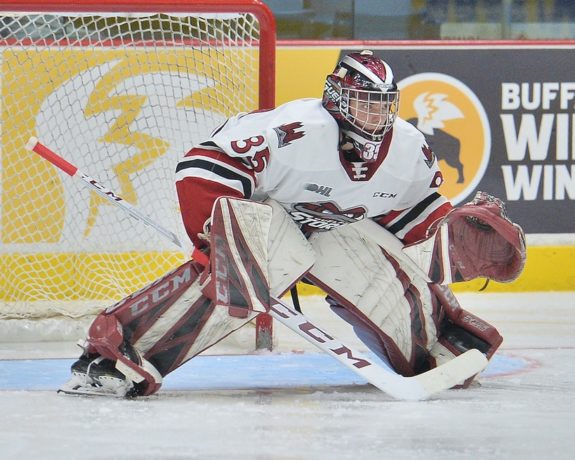
With Hofer and Daws, it’s the complete opposite. They’ve never represented Canada in the past, but their numbers in their respective leagues are astounding. Hofer leads the Western Hockey League in GAA, 1.81, and is second in SV%, .937. Daws, who wasn’t initially on Hockey Canada’s radar, played his way into selection camp to earn a spot. He leads the Ontario League with a 2.06 GAA and a .939 SV%.
Rodrigue has the advantage to be the starter, but I wouldn’t count out Daws or Hofer who combined to shutout Switzerland 3-0 and were great in their 4-2 win against Finland. However, the shootouts could be a problem, as both Daws and Hofer didn’t perform well in extra time. Goaltending needs to be the difference-maker if they want to have any chance of winning gold.
Forward Depth Will Be On Display
There’s no shortage of skill and talent up front for Canada. From the projected number one and two picks Alexis Lafreniere and Quinton Byfield, to the speed and ability to get in on the forecheck from players in a depth role, this is their greatest strength.
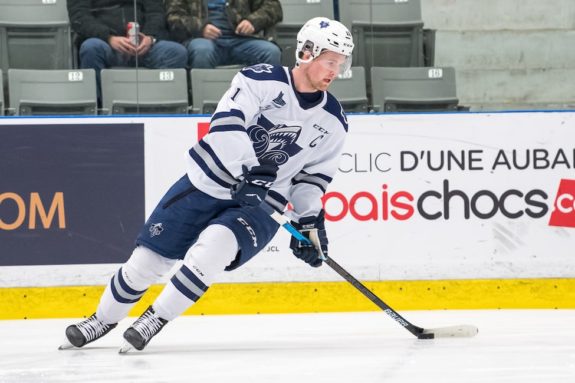
The addition of returning players of Joe Veleno (Grand Rapid Griffins) and Barrett Hayton (Arizona Coyotes), who are on loan from their pro teams, is an added bonus to an already deep forward group. Their experience at both the tournament and the pro level will benefit the team.
Byfield, Hayton and Dylan Cozens could be a strong offensive line with speed and size, while Nolan Foote, who scored twice against Team Finland was seen on the top line with Veleno and Lafreniere. Veleno and Lafreniere had great chemistry at the World Junior Showcase, and they’ll look to rekindle the fire that made them successful. This top six will no doubt carry the offensive load, but their offensive skill runs deeper than just the top six.
Canada already seems to have an impactful third line. Liam Foudy, Ty Dellandrea and Aidan Dudas were very impressive during their pre-tournament games as the line connected for two goals in two pre-tournament games. This was evident during the game against Switzerland where they scored an early goal eight seconds into the second period.
While other teams may have a few offensive weapons in their lineup, Canada has multiple threats on all four lines. This will make them hard to contain. The main philosophy from the beginning was built on a fast pace, puck possession game. We’ve seen that from every forward selected, which is why their depth will be an important factor.
Offense From the Defence
While Canada’s main strength lies up front, their defence isn’t too far behind in terms of it being a key aspect to winning gold this year. Much like the defensive group back in 2018 with Kale Clague and Cale Makar, Canada’s defensive pairings are just as deep, smart and extremely quick with the puck.
Ty Smith, Calen Addison, Bowen Byram and Jamie Drysdale will be relied upon in terms of offensive production. They aren’t afraid to rush and jump into the play when the opportunity comes. Their speed and vision allows them to act as a fourth forward and they aren’t afraid of taking a chance when they can. With the bigger ice surface, this plays into their advantage.
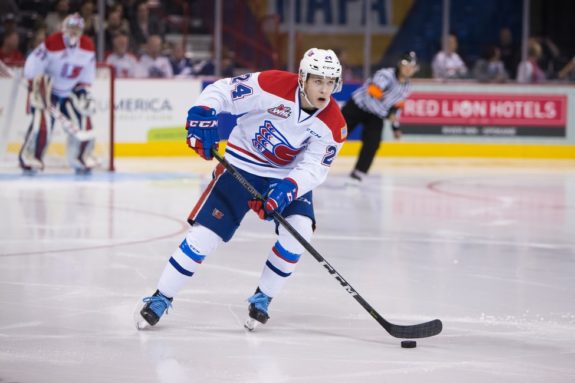
But their blue line isn’t just offense driven. Their positional play without the puck and the ability to shutdown in their own end is noticeable. While they have puck-moving specialists, all seven defenders are able to play steady defence. In games against Switzerland and Finland, Canada’s defence showed it can provide strong coverage in the defensive zone. This is what makes Canada’s defense distinctive; they have the perfect balance with their defense pairings where one aspect doesn’t outweigh the other.
Work Ethic and Intensity
When Canada is at its best, they are extremely tough to play against. From the very start of camp, the intensity and will to battle during practices and games was there. It seemed like this team was determined from the start, even before the first round of cuts. With Dale Hunter behind the bench, that’s exactly the style of hockey that he wants, no matter what the skill level is.
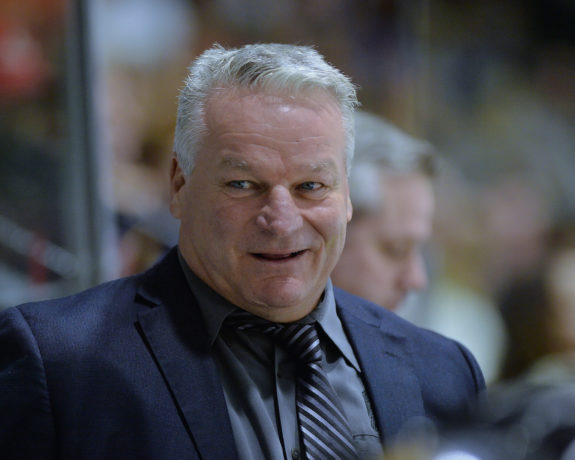
All four forward lines are capable of using their speed, skill and patience to gain as much zone time as possible. In addition, they are able to win puck battles and obtain possession by being aggressive on the puck carrier to create turnovers. There wasn’t one instance from anyone on the team where they gave up on the puck or trying to win a battle. The same mindset goes with the defence whenever they get involved with the play.
Their coverage has been extremely effective when they are on defence in order to negate any chances against. As mentioned previously, the benefit of having defensemen who can rush the play, yet still provide strong defensive coverage, is a great quality to have.
They want to be quick and provide that aggressive style in all three zones. This is essentially the Hunter style and mentality that they wanted from this team. And many players can attest to his style and ability as a coach.
Not Getting Ahead of Themselves
To say that last year’s result at the tournament was unacceptable is an understatement. Canada was only dominant in only one game, a 14-0 beat down against Denmark. Aside from that, they weren’t as fast as they were supposed to be. They were disorganized in all aspects of their game. In a short tournament where every game matters, their issues caught up to them, which became their downfall.
There is no easy game to start this tournament. Their first two games are back to back against the United States and Russia. This will be a real test for Canada’s depth and goaltending. There is no Denmark this time to get easy points. They can’t get ahead of themselves like they did last year, thinking each game will be easy.
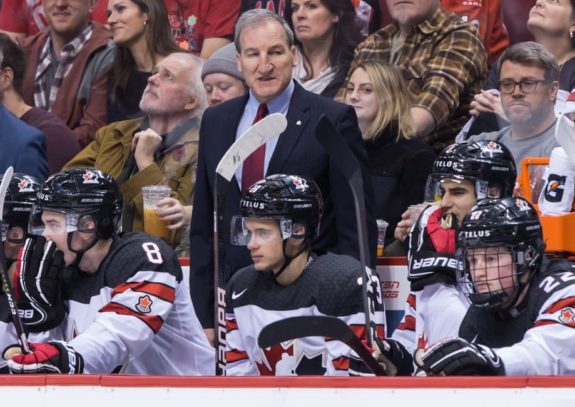
They need to be ready from the beginning. They need to be able to provide what made them successful during camp and exhibition games by utilizing their speed and size in the offensive and the defensive zone.
If they’re mentally prepared, then that’ll benefit Canada greatly in the tournament. Getting the tougher matchups at the start might be a good thing for them.
With a roster is this loaded with talent, they’re going to have to get contributions from everyone in all three zones of the ice in order to have success. Their strength up front and on the back end will be essential and their goaltending needs to be almost perfect if they want to have success.